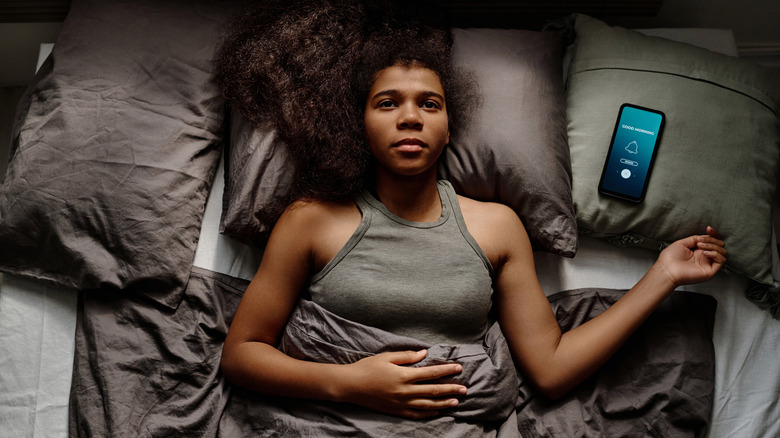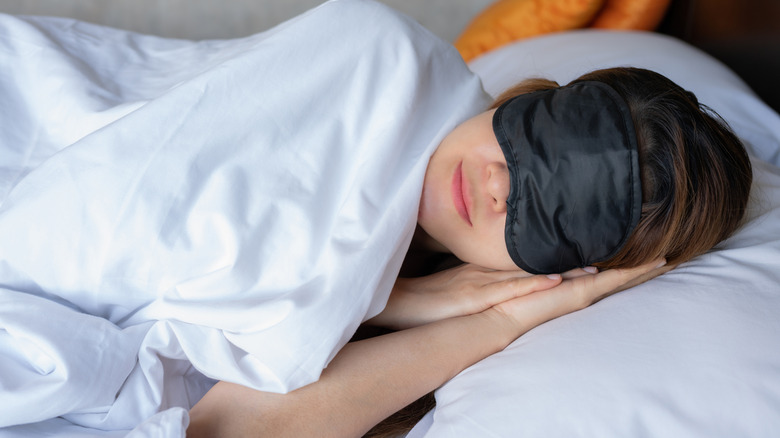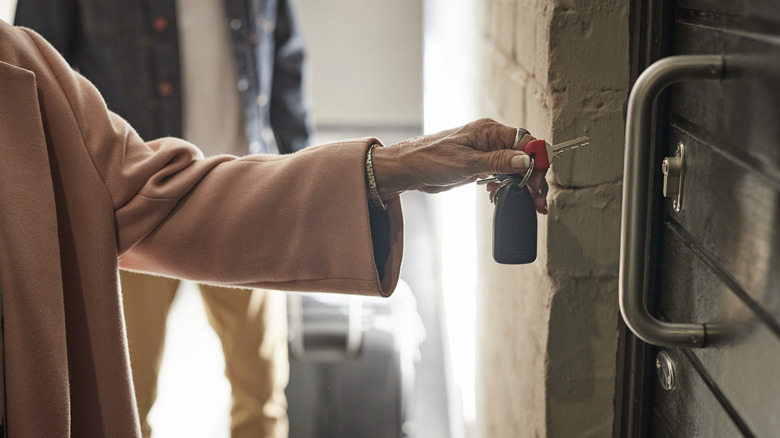Sleeping In A New Place Is Often Tough For Travelers, But What Can You Do About It?
We may receive a commission on purchases made from links.
Most travelers will understand that frustrating feeling all too well. You check into a hotel — exhausted from a full day or evening of traveling — and climb into the fluffiest bed you've ever seen ... only to find yourself staring at the ceiling for hours on end. And although most hotels are sneakily designed to help you sleep better than usual, there's actually a scientific reason for this common phenomenon.
Known as the "first-night effect" — described in scientific literature back in 1966 by a group of researchers — studies show that when travelers sleep in a new environment for the first time (be that a hotel, Airbnb, or even a friend's guest room), half of their brain stays more alert than the other, impacting their ability to fall asleep soundly. Why does the brain play double duty? Well, it's all thanks to the same primitive survival instinct that kept our ancestors safe from potential threats.
Unfortunately, this heightened sense of alert — while great for jungle and outdoor survival — isn't necessarily conducive to getting that much-needed shut-eye before next morning's business meeting or sightseeing adventure. Luckily though, there are plenty of tips to help you get a perfect night's sleep at a hotel, and they don't necessarily involve counting sheep until you bore yourself out. From controlling your environment to creating a familiar space, these easy-to-follow methods can help you drift off faster — all so you can wake up feeling refreshed.
It's all about designing the most comfortable environment
Put simply, creating a sleep-friendly environment when you arrive somewhere new is all about doing your best to control the situation. One way to do this is by making specific requests to ensure you have a more peaceful hotel stay. This includes asking for a room away from any high-traffic areas and communal spaces (think elevators, the pool, or communal event spaces) to minimize any noise disruption and potential disturbances.
If that's not possible, a sturdy pair of earplugs — like this pair from Loop on Amazon, designed specifically for sleep — or some noise-canceling headphones can do the trick. Throw in an eye mask for some added darkness (along with an increase in your natural melatonin levels), and you've got a recipe for uninterrupted rest.
Along with that, temperature also plays a crucial role in getting quality sleep. Ideally, your sleeping space should be cool — around 65 to 68 degrees Fahrenheit — for ultimate comfort. Even if that sounds a little too chilly, in most cases, it's a lot easier to warm up under a toasty duvet and some extra blankets than it is to try and cool down in a too-hot room. So go ahead and adjust the room's thermostat without fear.
Peace of mind plays an important role for sleeping in a hotel
Finally, there's the issue with peace of mind. After all, our brain stays awake because it's worried about danger, right? That said, in order to fight these primitive instincts, you need to nip that stress in the bud and add some extra security to your room with these helpful hacks. From keeping your phone and room key within arm's reach to double-checking the locks — or even traveling with your own portable door lock from Amazon — following some simple hotel safety tips can easily help reassure your subconscious.
Along with that, other simple tricks like hanging the "Do Not Disturb" sign on the door handle outside your room to avoid unwanted visits, requesting that any deliveries be left at the front desk, and even asking hotel staff to keep your stay a secret are great ways to both maintain privacy and maximize security. At the end of the day, your safety and comfort are the hotel's highest priority. And no matter how specific, hotel personnel will generally be more than happy to accommodate any requests you might have to ensure you feel at ease.


